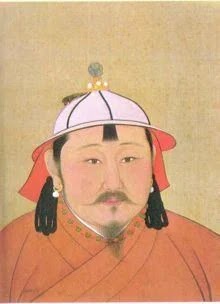In 1271, Edward, Duke of Gascony, went on a continuation of the Eighth Crusade that is sometimes called the Ninth Crusade and sometimes Lord Edward's Crusade. The Eighth had been started in 1270 by King Louis IX of France, but Louis died of dysentery when he reached Tunisia in Northern Africa. The Treaty of Tunis that followed resulted in freedom of Christians to preach and build churches in Tunisia, and the Crusaders went home.
To the east, the Mamluk sultan of Egypt, Baibars, defeated the Mongols and began attacking Christian crusaders, who appealed to Europe for aid. Edward and his brother Edmund were going to join Louis at Tunis, but were delayed because of their father's uncertainty whether he wanted to join (he was 63 at the time; I can personally understand his reluctance). The brothers reached Tunis mere days after the signing of the treaty, and opted to stay in Sicily at the invitations of Charles of Anjou, Louis' younger brother, while deciding what to do next.
Other crusaders went home, but Edward chose to continue, arriving at Acre on 9 May 1271 with a mere 1000 men, 225 of whom were knights. It was currently under siege by Baibars, who abandoned the siege rather than have the European military surround him. Baibars chose other goals, such as capturing Montfort Castle. Edward wrote to Abaqa Khan, current ruler of the Mongols, to promote a Franco-Mongol Alliance. Abaqa replied in the affirmative, asking for a date when they could jointly attack Baibars and the Mamluks.
Edward launched some raids with little effect, but the arrival of his brother Edmund with reinforcements emboldened him to larger attacks, especially when joined by local Templar, Hospitaller, and Teutonic Knights as well as 10,000 horsemen sent by Abaqa. The Mongol forces, however, after some victories and successful looting, retreated back across the Euphrates and left the Europeans to their own devices.
(Side note: during this time, Teobaldi Visconti, papal legate who had been to England to aid Henry in the Second Barons' War and had chosen to accompany Edward on Crusade, received word that he had been elected Pope; he returned to Rome as Gregory X. He also reached out to Abaqa Khan.)
In December 1271, lacking the Mongols, Edward and his forces took Acre after repelling another Mamluk siege. Edward realized the forces needed to maintain Christian occupation in the Holy Land were too meager. Understanding that peaceful negotiation was the only way forward, he managed a truce with Baibars of 10 years, 10 months, and 10 days. One month later, there was an assassination attempt on Edward, wounding him and delaying his return to England.
Edward went to Sicily in September 1272 to further recuperate.
There was never another Crusade to the Holy Land, despite discussions and requests in that direction. The Mamluks continued to re-take the areas that the Europeans had occupied. In 1275, Abaqa wrote to Edward, asking him for help against the Mamluks. Edward said he would consider it if the pope called for a Crusade, and thanked Abaqa for his earlier help. Abaqa wrote with the same request, apologizing for not providing more aid in 1271.
In 1291, pilgrims from Acre killed 19 Muslim merchants after being attacked by brigands. This was used as a pretext to attack Acre, the last Crusader state. With Acre out of Christian hands, the era of Crusades and a political presence in the Holy Land was over. The illustration is an 1835 oil painting titled "The Return of the Crusader" but often called "The Last Crusader," by Karl Friedrich Lessing.
But that was all in Edward's future. While resting in Sicily, he received news that his father had died. He began his journey back to England, where he was crowned King Edward I on 19 August 1274. We will see what kind of king he was next time.



















